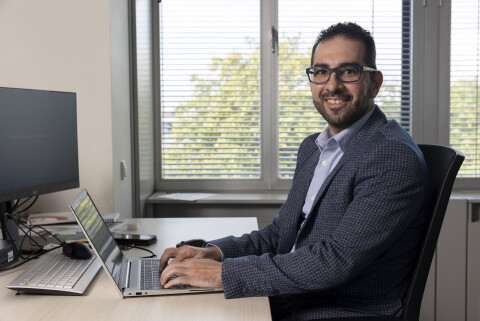
October 14th 2022
Other perspectives
Zakaria Alqabbani is from Syria and arrived in the Netherlands in 2019. He has now been working for nine months at the Ministry of the Interior (BZK), in the SSC-ICT department, as an OSB integration specialist. As part of Diversity Week, we spoke with Zakaria about his arrival in the Netherlands, the labor market and diversity.
Please note: this article was translated using a translator appWaiting means 'having time'
After about a year and a half in the AZC in Den Helder, Zakaria got a house in Amsterdam. “Life in the AZC mainly consists of 'waiting'. The waiting time for a house was also very long. I already had a residence permit after seven months, but it then took another nine months before I got my own place.”
But Zakaria also took advantage of the waiting period: he started with the Dutch language and integration. He was already almost at A2 level when he got his home, completed part of the integration process and started driving lessons while he still lived in the AZC. Zakaria wanted to be ready to start working in ICT quickly: he came here with a Computer Science diploma (HBO bachelor's degree) and ten years of work experience. He wanted to continue in that field and was unsure whether to study or work.
When Zakaria came into contact with Refugee Talent Hub, he heard about the partnership with BZK and the application process for the SSC-ICT department. Zakaria applied, was offered a job and was over the moon: “I was so happy that I could come and work at BZK! My work gives me independence and independence. I really want to develop myself further and enjoy a challenge. I have a supervisor and a language coach who help me, and very nice colleagues who support me. Everyone wants me to be successful, which feels really nice.”
Motivation
That all actually sounds quite smooth – weren't there any bumps? “I think it was very important that I had a plan from the beginning. And I was lucky that my diplomas were immediately well appreciated. That doesn't apply to everyone. I didn't find the Dutch culture very difficult either, and so many people want to help you. What I found difficult is that I had to think about why I wanted to work somewhere. My motivation 'I just want to work and no longer receive benefits' was really not good enough. I was rejected for this in my first job interview at another organization. In Syria you are never asked about your motivation! I really had to get used to that. Luckily I had a language buddy who explained this to me. That was an important lesson.”
Diversity is valuable
The theme at the Ministry of the Interior and Kingdom Relations for Diversity Week is 'Difference Enriched'. We asked Zakaria how he makes a difference. “What a difficult question! You should actually ask my colleagues that,” he says modestly at first. He thinks about it for a moment. “I think I add something to the team because I sometimes think and look at things in a different way. We all know the same thing from a technical perspective, but from my experience and background I can offer a different perspective on certain issues,” says Zakaria. “Diversity is very important in a team. I think that everyone who is in a team makes a valuable contribution, precisely by thinking differently sometimes.”
Make a plan
Zakaria believes it is important to help and inspire other status holders. What are his tips for newcomers? “Make a plan, because if you don't make a plan, someone will make it for you (and that might not suit you). Get started today. Start with language and integration. Because if you understand the language, you can also communicate with the GP, the municipality and the housing sector. It makes you independent. And look for work that suits you. There are many organizations that can help you with this too. Dare to try and ask for help. I sometimes hear people say that there is no point in working because they will receive just as much income as they would with benefits. But that's not right, because you build something for yourself when you work! You have freedom, pension, independence... You get to know people, you build a social network. You can be yourself again. That is worth a lot.”
The partnership between BZK and Refugee Talent Hub
Michelle Engelen, Policy Advisor on Diversity and Inclusion: “BZK has entered into a partnership with Refugee Talent Hub to use the talents of status holders for the organization. In addition, the BZK considers it important to help status holders with their participation in Dutch society and the labor market. Especially now that the shortage on the labor market is increasing, the use of the capabilities of status holders is becoming increasingly urgent. Just look at all the vacancies in the IT field within BZK. The integration of status holders is part of BZK's policy to be a diverse and inclusive organization, or in other words an attractive employer for everyone.